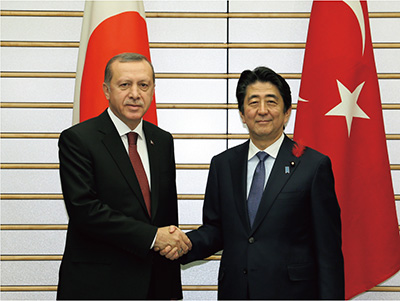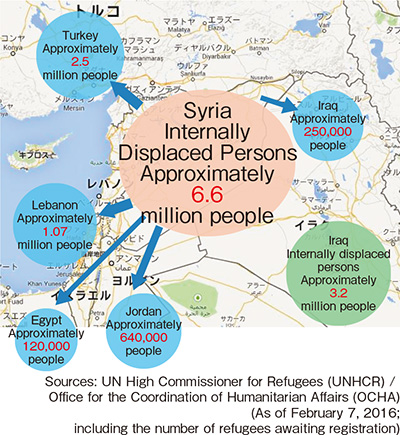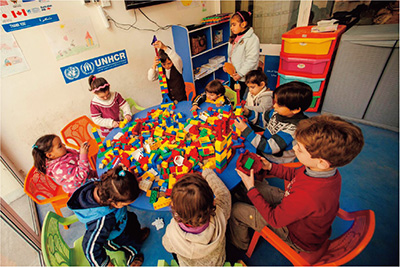Diplomatic Bluebook 2016
Chapter 2
Japan’s Foreign Policy that Takes a Panoramic Perspective of the World Map
6.Countries in the Middle East and North Africa
(1) Turkey
Turkey is a large and geopolitically important country located at the crossroads to Europe, the Middle East, Central Asia, and Caucasia. The country assumed the chairmanship of G20 in December 2014, and its presence in the international community has been increasing.
In the elections held in June, the Turkey’s ruling Justice and Development Party (AKP) failed to obtain the majority of seats for the first time since 2002 when the party took over the reign of government. The discussion between the ruling and opposition parties for a coalition administration did not reach an agreement, and President Recep Erdogan decided to hold a re-election. The re-election took place in November, where AKP again obtained 317 seats, more than the majority, and a new administration headed by Prime Minister Ahmet Davutoglu started.
As a member state of NATO, the Government of Turkey basically attaches importance to Europe and U.S. in its diplomacy, including efforts to join EU. The AKP administration proactively promotes multiple diplomacies with states covering Asia and Africa including its efforts to stabilize the neighboring region and strengthen the relationship. On the other hand, in recent years, the relations between Turkey and Syria, particularly under the Assad Administration, have deteriorated. Turkey faces many problems, including the fight against ISIL and terrorists, accepting more than two million Syrian refugees as the largest host country in the world. After the downing of a Russian fighter jet in November 2015, tension with Russia has been increasing.
 Japan-Turkey Summit Meeting (October 8,Tokyo; Photo: Cabinet Public Relations Office)
Japan-Turkey Summit Meeting (October 8,Tokyo; Photo: Cabinet Public Relations Office)In respect of the relationship with Japan, the year 2015 marked the 125th anniversary of the Ertugrul Frigate Disaster, which is believed to be a keystone of Japanese-Turkish friendship. The year also marked the 30th anniversary since Japanese hostages in Teheran were rescued. Commemorating these events, many mutual visits and anniversary programs were organized. On the summit-level, President Erdogan visited Japan as a guest on Official Working Visits in October, and Prime Minister Abe visited Istanbul in November and attended the G20 Antalya summit, confirming the high trust between the two leaders.
(2) Jordan and Lebanon
The situation in Jordan is stable in the constantly turbulent Middle East region. Jordan has played an important role in the peace and stability of the region, such as with countermeasures against extremists, its acceptance of a number of Syrian refugees, and active involvement in the Middle East peace process. The country’s role is highly appreciated by the international community.
Prime Minister Abe visited Jordan in January 2015, and had talks during a working lunch at the Asia-Africa Conference (in Jakarta, Indonesia) in April and the UN General Assembly (in New York, U.S.) in September. Traditionally friendly bilateral relations have deepened even further. At each meeting, the leaders shared the view of cooperating for further development of the bilateral relations and stabilization of the Middle East region.
Japan also attaches importance to Jordan, which serves as a cornerstone for the stability of the region. The Government of Japan has been providing assistance for the stability of Jordan through support for refugees and host communities, as well as for developing the industrial base. In 2015, Japan provided a “Fiscal and Public Service Reform Development Policy Loan” (24 billion yen) in loans, as well as non-project grant aid (two billion yen).
Lebanon is a mosaic nation consisting of 18 religions and religious sects, including Christianity and Islam. Due to the confrontation between each sect and political force, no successor to President Michel Suleiman, whose term of office ended in May 2014, has been elected yet (as of December 2015). The tenure of the incumbent parliament members was again extended to June 2017 as well. There is no prospect of an election, either.
In August, demonstrations in the range of a few to ten thousand protesters took place, sparked by a garbage-collection crisis at the central part of the capital Beirut. Many individuals were injured in collisions between demonstrators and the Security Forces, showing the internal instability. In November, a terrorist bombing occurred with many casualties in the south suburb of Beirut. The deteriorating situation in Syria and the expansion of ISIL are serious problems that could significantly affect the region. Facing these issues, stability in Lebanon is the key to the stability and prosperity of the Middle East. Japan has provided Lebanon with humanitarian aid of 77.95 million US dollars for assistance to Syrian refugees in total.
(3) Egypt
Located at the north-eastern edge of the African continent and facing Europe on the other side of the Mediterranean, Egypt is a large country which plays an important role for the stability of the Middle East and North Africa.
Parliamentary elections were conducted from October to December 2015 as the final stage of the “road map” which had been developed after the political turmoil in 2013.
Prime Minister Abe visited Egypt in January and had talks with Egyptian President Adel Fattah el-Sisi and Prime Minister Ibrahim Mahlab. They issued a comprehensive joint statement to deepen the bilateral ties in the future. At a Joint Meeting of the Japan-Egypt Business Committee, Prime Minister Abe delivered a policy speech entitled “Moderation is the best policy: Toward a Vigorous and Stable Middle East - Japan and Egypt, Turning a New Page.” On behalf of the Government of Japan, Parliamentary Vice-Minister for Foreign Affairs Sonoura attended the Egypt Economic Development Conference in March and the New Canal Inauguration Ceremony in August. Foreign Minister Sameh Shoukry visited Japan in November and had a working lunch meeting with Foreign Minister Kishida. He also paid a courtesy call on visit to Prime Minister Abe. Also, there has been a growing cooperation in the field of security. Following the first political and security dialogue and defense dialogue which were held in October 2015, ADM Katsutoshi Kawano, Chief of Staff, Joint-Staff of the Japan Self-Defense Force visited Egypt in December and met with Chief of Staff of the Egyptian Armed Forces Mahmoud Hegazy.
(4) Maghreb
The Maghreb is located at the crossroads to Europe, Africa and the Middle East, and has shared commonality in history, culture and language. Recently it has increasingly attracted attention because of a potential as a region particularly in the area of economy. On the other hand, many people move from the region to Iraq and Syria as ISIL foreign fighters, and the emerging threat of Islamic extremists poses a serious problem.
In Tunisia, a new coalition consisting of secular Islamists and moderate Islamists was formed in February. As a result, the political process to democratization was accomplished after four years. However, terrorist attacks targeting tourists and government officials have been taking place, and security is of urgent priority.
Libya has fallen into a situation of serious conflict among several groups rooted in tribes and has experienced security deterioration. Domestically, west (Tori Bori) and east (Tobruk) factions led to the formation of two governments. ISIL is also active taking advantage of the luck an integrated national authority. In December, as a result of mediation efforts by the international community centered around the UN over one year, the documents on a political agreement for establishing a united government was signed. Not only for the stability of the country but also for the neighboring region, the Government of Libya is expected to transform itself into a state where all political forces act as a monolithic entity with support from the international community.
The Government of Algeria has initiated various reforms, including an amendment to the constitution. Morocco has sustained robust economic growth. In cooperation with the UN, the two countries make efforts to contribute to peace and stability of the region by mediating the domestic confrontations in Libya and Mali.
(5) Gulf countries (including Yemen)
A. Six Gulf countries (the United Arab Emirates (UAE), Oman, Qatar, Kuwait, Saudi Arabia, and Bahrain)
While the Middle East faces many security challenges, the Gulf countries which proclaim themselves as moderate and stabilizing forces of the region, have been promoting mutual solidarity to counter the violent extremism and to promote moderate thought. Japan recognizes these countries as important partners from the viewpoints of energy security and diplomacy toward the Middle East. There were frequent mutual visits of dignitaries such as the visit of Emir of the State of Qatar Tamim Bin Hamad Al-Thani to Japan in February 2015.
These states need to review their fiscal policy following a dip in their annual revenue due to sluggissh international oil prices since summer 2014. In the long run, they attach importance to such issues as social and economic infrastructure development, industrial diversification, and human resource development with a view to overcoming dependence on oil and to develop the private sector. Japan engages in improving the mutual business and investment environment through various agreements being concluded with the countries, while continuing to aim to strengthen the “Comprehensive Partnerships” in a range of fields beyond the energy area. Also, Japan and Saudi Arabia held commemorating events since the year 2015 marked the 60th anniversary for the establishments of Japan and Saudi Arabia established diplomatic relations.
B. Yemen
Since January 2015, the Houthi, a Shiite military group, advanced into the capital Sanaa, then Aden, which forced President Hadi to evacuate country. The Government of Yemen with military assistance from the Arab coalition forces led by Saudi Arabia regained control over southern five prefectures, including Aden, by September and this led to President Hadi’s return to Aden. In December, the peace talks were held under the UN mediation efforts.
The Government of Japan continued assistance to overcome Yemeni humanitarian crisis through efforts such as providing an emergency assistance to the refugees and internally displaced persons in May, and announcing a new food assistance at the Meeting on the Humanitarian Situation in Yemen at the UN General Assembly in September. Furthermore, Minister of Information, Nadia Sakkaf visited Japan in August.
 Situation of Syrian refugees and internally displaced persons
Situation of Syrian refugees and internally displaced personsLocated in the Fertile Crescent region spreading from the Tigris and Euphrates rivers to the Nile River, Syria has been an agricultural country since the ancient Orient era. The country also boasts a long history and culture, with world cultural heritage such as the Site of Palmyra, which was a flourishing relay city on the Silk Road.
In March 2011, a crisis struck people living in Syria. Since then, more than 250,000 people have died in Syria, more than 6.6 million people have been internally displaced and more than 4.6 million people fled out to neighboring countries as refugees (as of February 2016, UN statistics), caused by fierce fightings. This situation still continues with no signs of abating. Some Syrian refugees are living in refugee camps, but many of them are living outside the refugee camps. They have been forced to lead a hard life in each of their evacuation destinations.
Amid the prolonged Syria crisis, the countries surrounding Syria (See the figure) have accepted a large number of refugees almost to the limits of their capacity, causing such problems as friction between the refugees and the host communities. Also, the refugees and immigrants entering European countries increased explosively in 2015. Many of them are recognized as refugees from Syria.
 Refugee registration center in Jordan
Refugee registration center in JordanAt the United Nations (UN) General Assembly, Prime Minister Abe in September 2015 committed to implement financial support of about $810 million for refugees and internally displaced persons in Syria and Iraq. And as part of new assistance in Lebanon, Prime Minister also announced to promote collaboration between humanitarian assistance and development assistance and provide about $2.5 million in humanitarian aid to countries neighboring the European Union (EU) such as Serbia and Macedonia, which cannot enjoy the EU safety net despite being located on the migration route of refugees and immigrants (in November, Japan announced to provide additional aid of about $2.7 million for the countries neighboring the EU). As long as the Syria crisis continues, the international community needs to continue assistance for Syrian refugees, internally displaced persons and the host countries. At the same time, to genuinely solve the problems regarding Syrian refugees, political solution for Syria crisis is essential. To this end, it is expected to take a certain amount of time, but while a growing number of Syrian refugees cannot receive enough education due to the protracted crisis. It is important to develop human resources through the support of education and vocational training so that reconstruction can be executed when the Syria crisis ends and Syrian refugees return to their home country in the future. In particular, education for young people helps prevent them from being exposed to extremism. Japan intends to continue implementing support for the future of Syria, including education and vocational training, in addition to urgently needed assistance, such as health, sanitation, and food assistance, based on the idea of improving the situation by thinking about the root causes of the problem thoroughly so that the refugees can return to Syria in the future and rebuild the country as used to be colored by the grace of rich history and blessed with gifts from the land again.

